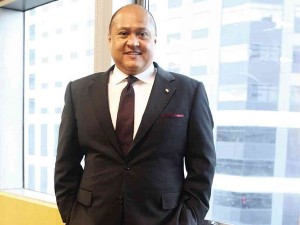HSBC: renminbi to be major trading currency in PH
British banking giant HSBC sees the Chinese renminbi (RMB) – recently declared by the Bangko Sentral ng Pilipinas (BSP) eligible to form part of the country’s foreign currency reserves – turning into a major trading currency in the Philippines in the next five years.
HSBC Philippines president Wick Veloso, one of over 450 businessmen from the Philippines who joined the delegation to China during last week’s state visit by Pres. Rodrigo Duterte, said in a press statement that the BSP’s move to include the renminbi as part of the official reserve currencies was sending a strong signal to banks and the market to start using the currency locally.
While the use of renminbi locally was still at an early stage Veloso said it’s inevitable that clients would start thinking about this currency given that China was the second largest economy in the world and the Philippines’ top importer and second largest trading partner.
“Businesses are finding the RMB much easier to use. As financial regulations evolve, and as they become more accustomed to using China’s currency, businesses have less difficulty understanding regulations, navigating documentary requirements and moving funds than they did in the past,” Veloso said.
During last week’s Philippine state visit to China, Trade Secretary Ramon Lopez projected that the Philippines’ trade with China could reach $60 billion in five years with the renewed friendship between the two countries. He said the same could be expected from investment flows and influx of tourists.
Based on data from the Philippine Statistics Authority, Philippine exports to China rose by 7.9 percent from $5.7 billion in 2010 to $6.2 billion in 2015. In the first seven months of 2016, China ranked as the fourth largest destination of Philippine exports, with 10.2 percent share to total exports. Meanwhile, Philippine imports from China grew from $4.6 billion in 2010 to $11.5 billion in 2015.
By 2013, China had become the biggest source of Philippine imports, and this continued in the first seven months of the year, with imports from China at 18.5 percent ($8.4 billion) of total imports. In terms of tourist arrivals, data from the Department of Tourism show that in July 2016, China ranked as the second biggest visitor market for the Philippines, an improvement from its fourth place ranking in 2015.
“Within little more than a decade, the renminbi has gone from being almost exclusively domestic to being an important player in global payments and trade settlement,” Veloso said.
The HSBC executive said that the inclusion of the RMB in the International Monetary Fund (IMF)’s special drawing rights (SDR) inclusion had now catapulted it into the ranks of the world’s most important reserve currencies. He said this would give greater confidence to companies and institutions around the world to settle trade in renminbi and invest in RMB-denominated assets.
“It is interesting to see that views about RMB’s future impact have diverged since 2014. The use of the RMB as a major trading currency in the Philippines has, since 2014, been seen to materialize in the next five years or so, and HSBC has initiated talks with its clients to inform them of the advantages on the use of RMB and help them understand and appreciate how the RMB has matured as a global currency,” Veloso said.
“Using renminbi has become easier than ever before. It can certainly improve relationships with trading partners while helping mitigate foreign exchange risk. If you trade with China and are not at least looking at whether the renminbi is right for your company, you may be putting yourself at a competitive disadvantage over the long term,” he said.
Veloso said HSBC was excited to get into more conversations with clients on RMB and together explore opportunities on trade, investment, cash management and funding. He added that HSBC was “RMB-ready” with its full suite of capabilities on renminbi, ranging from deposit accounts to remittances, renminbi-denominated LCs and other trade products to renminbi-denominated bonds.















